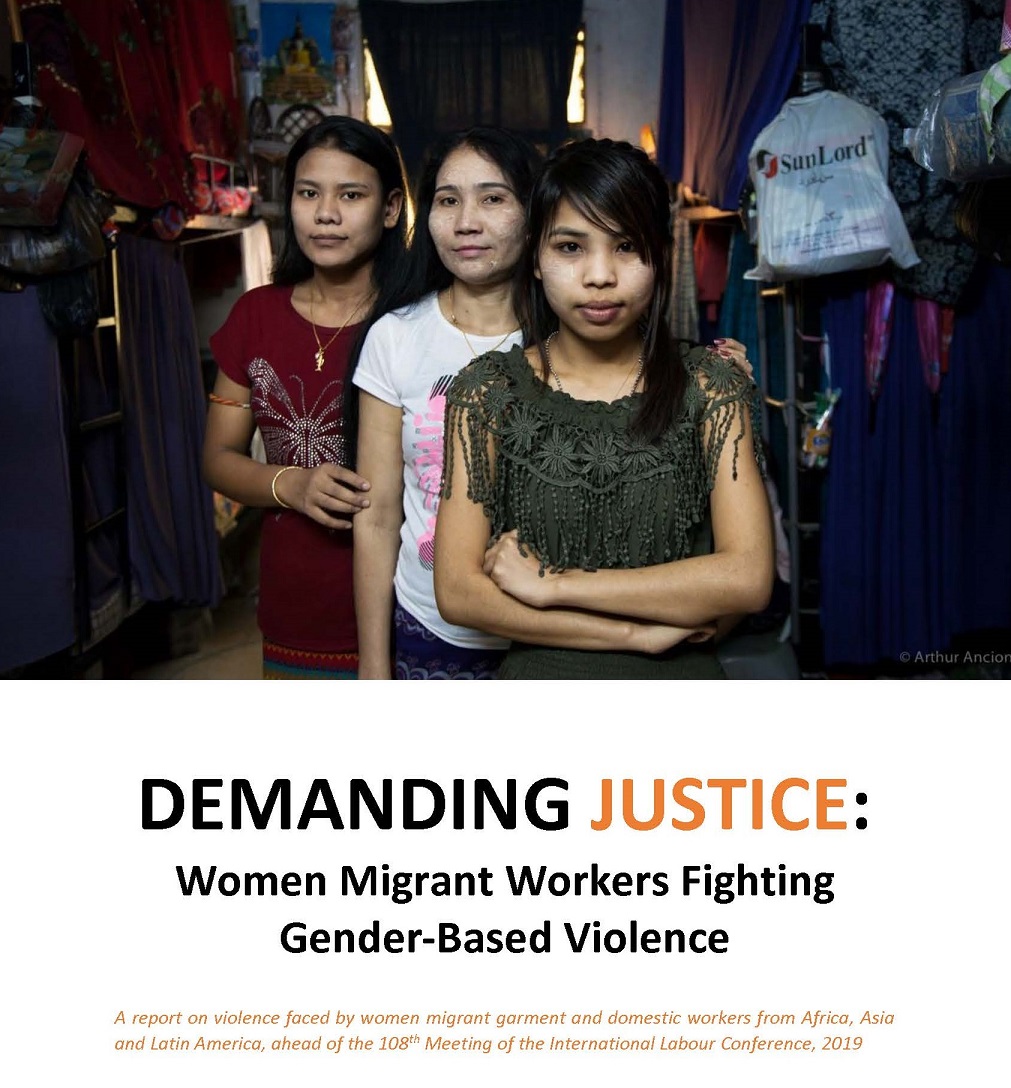Women migrant workers subjected to physical and sexual abuse, discrimination and non-payment of wages: New report
| Versión en español | version française |
 Women migrant workers experience a continuum of gender-based violence and harassment, ranging from insults to severe physical abuse, rape and sexual assault, psychological abuse, bullying and intimidation, according to a new report published today by the Global Alliance Against Traffic in Women.
Women migrant workers experience a continuum of gender-based violence and harassment, ranging from insults to severe physical abuse, rape and sexual assault, psychological abuse, bullying and intimidation, according to a new report published today by the Global Alliance Against Traffic in Women.
This gender-based violence cannot be considered in isolation from the patriarchal ideas about women’s place in society, the value of their labour, and the abuse that women experience throughout their lives.
One migrant domestic worker from Bangladesh shared, “I was being abused physically and mentally by my husband but how could I go and complain? What will society say? Because we are women we have to tolerate such abuses.”
A migrant garment worker from Guatemala said, “In our homes, people think that women have to do everything and receive less payment, and because they teach you that at home, then you think that it is normal and you internalise it.”
Women migrant workers described being pushed into precarious work with little choice because of a lack of jobs in their countries of origin, debt, economic hardship and the breadwinner role falling to women.
These dynamics are occurring in part due to macro-level economic decisions: structural adjustment policies, austerity measures, neoliberal reforms to the public sector and pubic services have increased the demand for more feminised jobs.
Ninety per cent of those interviewed in Cambodia reported being driven to migration for garment work to repay a debt to a microfinancing institution.
Migrant women in the garment sector in Thailand reported being paid less than the legal minimum wage of 310 baht (10 USD) per day, with some being paid as little as 160 baht (USD 5) per day.
Women garment workers in Brazil said that due to piece-rate payment schemes, they had to work 18-hour days in order to make just enough money to survive – an amount still only two thirds of the national minimum wage. They also highlighted that they were paid less than men for doing the same work.
Many domestic workers told stories of sexual violence, often perpetrated by male family members living in the house.
One Bangladeshi woman said, “My employers’ son always came in wherever I was in the bathroom, kitchen, roof top, veranda. He used to touch my breasts and other sensitive parts of my body. There was nothing I could do.”
In addition to sexual abuse, domestic workers frequently reported punishing working hours, substandard living and working conditions, and insufficient food. Many worked all week, without a day off, and had to continue working even when they were sick.
One Ethiopian domestic worker in Lebanon said, “The employers considered us as slaves. The household task was endless. We were overwhelmed and consumed by it. We were deprived of sleep all the time.”
A Ugandan domestic worker recounted being shouted at, “You are not allowed to fall sick! We have paid a lot of money for you to come and work, so you have to pay it back by working. Get up!”
Women want decent work! Low wages were the biggest problem women faced. To this end, women are demanding decent work, including a living wage, equal pay for work of equal value, rights to organise and bargain collectively, permanent jobs and paid leave. Women in garment factories want production targets to be lowered to manageable levels.
Women want rights at work! Women workers need full freedom of association and collective bargaining, including by states ratifying ILO Convention No. 87 to facilitate effective self-organising. They also want workers’ centres to be established so that migrant workers have space to organise and access services.
Women want rights as migrants! Women workers are calling for the abolishment of the sponsorship system, improved monitoring of recruitment and migration systems, active roles for labour attachés in the destination countries, and an end to gender and age discriminatory government bans on migration.
The 108th International Labour Conference is starting in Geneva this week, and states, employers and trade unions are deliberating on a new instrument on “Violence and Harassment in the World of Work”.
If this instrument is to be effective, it must address the root causes of violence comprehensively and expose its embeddedness in neoliberal globalisation and patriarchy.
To this end, the instrument must address structural factors of inequality and discrimination, as well as deliver tangible results for all people who work, paid and unpaid, and regardless of sector and migrant status.
The report is based on research among women migrant workers carried out by thirty organisations and individual researchers across twenty-two countries in Asia, Africa and Latin America. The aim of the research was to document the nature of violence, harassment and exploitation that women migrant workers face, how they deal with it, and their demands for change.
Download the complete 28-page report Demanding Justice: Women Migrant Workers Fighting Gender Based Violence here.
Download the six-page summary of findings on violence and harassment that migrant domestic workers experience here.
Download the ten-page summary of findings on violence and harassment that migrant garment workers experience here.
For more information or media inquiries, you can contact Leah Sullivan at This email address is being protected from spambots. You need JavaScript enabled to view it. or +66 2 864 14 27.

